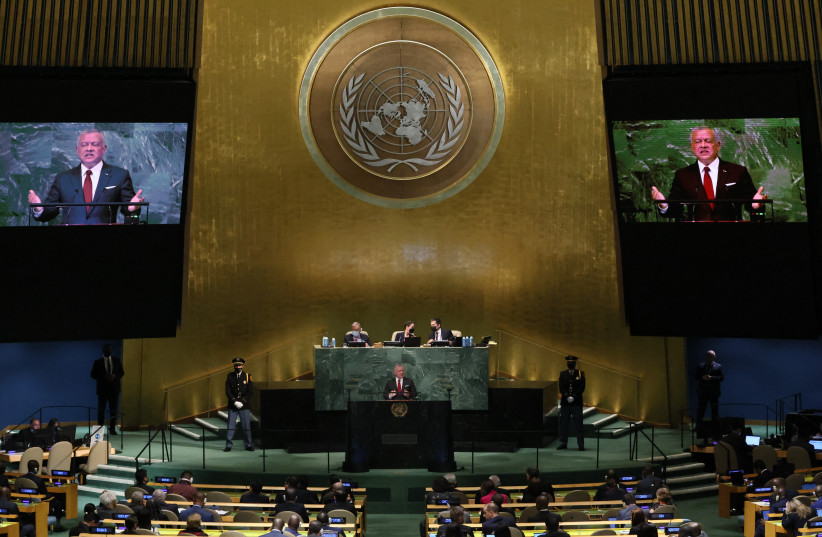Christianity is under attack in Jerusalem, Jordan’s King Abdullah said Tuesday at the United Nations General Assembly in New York prior to his meeting with Prime Minister Yair Lapid.
“The rights of churches in Jerusalem are threatened,” he said.
Abdullah, as the head of the Hashemite Kingdom, is also considered to be the custodian of Muslim and Christian holy sites in the city.
“Christianity in the holy city is under fire... this cannot continue,” Abdullah said. “As custodians of Jerusalem’s Muslim and Christian holy sites, we are committed to protecting the historical and legal status quo and to their safety and future. We are committed to defending the rights, the precious heritage and the historic identity of the Christian people of our region.”
“Nowhere is that more important than in Jerusalem,” said Abdullah, who spoke during the first morning of the high-level opening session of the 77th UNGA. The annual event draws many national leaders from around the globe.

Overall, “the future of Jerusalem is an urgent concern,” he said at the plenum. “The city is holy to billions of Muslims, Christians and Jews around the world. Undermining Jerusalem’s legal and historical status quo triggers global tensions and deepens religious divides. The holy city must not be a place for hatred and division.”
"The rights of Churches in Jerusalem are threatened."
King Abdullah II
Abdullah calls for two-state solution
What did Jordan's King Abdullah say about the Israeli-Palestinian conflict?
Regarding the Israeli-Palestinian conflict, Abdullah called for a two-state resolution based on the pre-1967 lines, with east Jerusalem as the capital of a Palestinian state.
The Palestinian people deserve a state, he said, adding that the Palestinian people with their “resilient national identity cannot be denied the right to self-determination.”
Concerns raised of Temple Mount violence in upcoming holidays
Abdullah spoke as tensions have risen between Israel and the Palestinians in the West Bank and amid concerns of an outbreak of violence on Jerusalem’s Temple Mount during the upcoming High Holy Days.
The Temple Mount, also known to Muslims as al-Haram, al-Sharif, is the holiest religious site for Jews and the third holiest for Muslims.
The Palestinians have routinely accused Israel of violating the status quo put in place after the Six Day War, in which Jews and Christians may visit the site, but only Muslims may worship there.
Lapid and his predecessors Naftali Bennett and Benjamin Netanyahu have all insisted that Israel is committed to the status quo and that there is no change in policy.
The police, however, have not fully prevented Jewish worshipers from praying at the site, and the numbers of those who successfully do so have grown, with one NGO estimating that 50,000 Jews prayed there this year.
Lapid, again like his predecessors, believes that Jerusalem should remain Israel’s united capital and that it should not be divided along the pre-1967 lines.
Jordan has been an important partner for Israel in reducing tensions in Jerusalem and the West Bank.
Relations between Israel and Jordan frayed during Netanyahu’s 12 years as prime minister, but they regained momentum under Bennett and Lapid.
Within weeks of taking office in July, Lapid visited Abdullah in a meeting symbolized by the warm way the two men grasped each other’s shoulders. But Abdullah’s speech at the UNGA introduced an element of antagonism into the relationship and appeared to attack Israel on the issue of Jerusalem. Notably, the speech was delivered just hours before the two men were scheduled to meet.
The spotlight, however, had been on the scheduled meeting between Lapid and Turkish President Recep Tayyip Erdogan, which was set for late Tuesday afternoon in New York.
Their face-to-face conversation was to mark the first such meeting between an Israeli prime minister and Erdogan since 2008 – symbolic of the warming ties between the two countries after a long period in which diplomatic relations had declined.
Erdogan referenced the Israeli-Palestinian conflict in his speech, calling for a two-state solution and also speaking of the importance of “respecting al-Haram, al-Sharif.”
“We have to stop the illegal [West Bank] settlements in the occupied regions through establishing security for the lives and the commodities of the Palestinians,” he said.
“We have to establish a permanent and fair solution for the region, with eastern Jerusalem becoming a capital and establishing a free and sovereign Palestinian state,” he added. “There are no other solutions than this.”
Turkey plans to work for the establishment of a two-state resolution to the conflict, Erdogan said.
Lapid arrived in New York at sunrise on Tuesday for his first trip to the UNGA and his first address to it.
His speech is scheduled for Thursday and his most significant diplomatic address to date. It is set for a forum that Netanyahu dominated for years when he was prime minster.
Palestinian Authority President Mahmoud Abbas is scheduled to speak to the UNGA on Friday after Lapid returns to Jerusalem. There are no plans for the two to meet.
Lapid is not expected to meet with US President Joe Biden. He met with UN Secretary-General Antonio Guterres on Tuesday and was scheduled to meet his British and Greek counterparts, Liz Truss and Kyriakos Mitsotakos, respectively, sometime during his visit.
Among the global topics likely to dominate the UNGA’s opening session are Russia’s war on Ukraine and Iran’s growing nuclear program.
Ukrainian President Volodymyr Zelensky is scheduled to deliver a virtual address to the UNGA on Wednesday.
Russian President Vladimir Putin will not be at the assembly, but Foreign Minister Sergey Lavrov is scheduled to speak there on Saturday.
Both Biden and Iranian President Ebrahim Raisi are scheduled to be at the UNGA and deliver addresses on the same morning.
